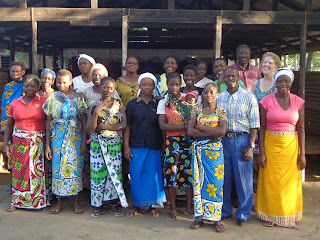African having been raised under African Traditional Religion experience religion in terms of the Old Testament and pass those beliefs and practices along to their children and grandchildren. The New Covenant was introduced about 100 years ago when western missionaries first arrived. Shortly after realizing the abundance of resources on the continent, a very cruel colonization began. Present day African religion has yet to fully experience the New Covenant, and freedom in Christ.
Forced colonialism created a forced dependence not very
different than what we know as slavery, stripping many Africans of any sense of
self-worth, self-determination, self-motivation, and self-reliance. Add to that
the increase of short-term missions—organized by many good-intentioned but
ill-informed leaders—and many Africans feel compelled to pursue
colonialist-western ideologies including wealth accumulation.
Short term teams, with pure and good hearts, often
unwittingly point out all the problems in African society because of the often
stark contrast to their own and fail to rejoice in the presence of God there.
“Can you believe those people live in mud huts?” “Look at those rags they’re
wearing!” and the western response is to fix things for them according to what
they think “those poor Africans” should have, which often mirrors an
unachievable western consumer lifestyle.
Soon Africans adopted the perspective of these western do-gooders and
began seeing themselves as insufficient in every way.
Not only have westerners created a need in Africa that
wasn’t there before, we’ve also created a mindset that all good things come
from the West rather than from Christ. We’ve created a scenario where
westerners coming into Africa are viewed as walking ATM machines, as a source
to be manipulated for individual good. Rather than having authentic
relationships together, we foster a God-complex mindset in ourselves and a
poverty mindset in Africans.
We all have the opportunity to change all we have “done unto
others” by changing the way we do missions and ministry. Surprised by Hope is
part of that change by bringing business teaching based on the Bible. This
business education is drawn from Scripture and tailored for the African
marketplace and lifestyle. We celebrate African culture and instill a
God-shaped value of who they are in Christ. We draw out the resources from
within the community and help Africans discover how those resources can help
them grow both economically and spiritually. We realize that God is already
there; nothing we can do will make God more or less present in East Africa.
However, everything we do can return the surprise of the Living Hope (1 Peter
1:3-4).
Let me close by saying that Africa is a big content, four
times the size of the United States with four times the population of the U.S.
And so these realities apply to varying degrees across the continent and differ
significantly from urban to rural settings. My primary experience is in East
African small towns and villages. Let me also add that my observations about
short term missions, however valid, are very slowly changing. We are realizing
the error of our ways and finding new approaches to serving alongside our
African brothers and sisters, with many thanks to books like When Helping Hurts and Toxic Charity. And we’re not finished
yet.
Contact info@surprisedbyhope.org
to talk more about this article, about how to help without hurting, or to learn
more about Surprised by Hope.



